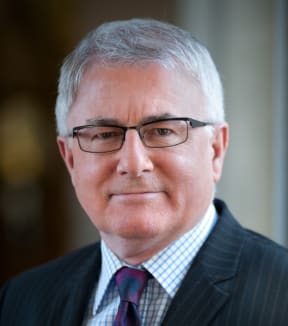The Minister for Climate Change Issues says there is no point extending the life of the Kyoto Protocol.
Tim Groser says it is far better to push for something more comprehensive when he joins the latest session of climate change talks in Doha this week.
Negotiators from nearly 200 countries, including New Zealand, meet in Doha, Qatar, from Monday in an attempt to find common ground on issues like curbing greenhouse emissions.
The talks are aimed at securing a new treaty by 2015 that would cap emissions from all countries including developing nations and come into force by 2020.

Tim Groser. Photo: NATIONAL PARTY
Some nations want the Kyoto Protocol, which expires this year, to be renewed until 2020.
Mr Groser says the signatories to that pact make up only a small part of total greenhouse gas emissions, and New Zealand, Canada, the United States, Japan and others are seeking to replace the protocol with a new, comprehensive scheme.
"Kyoto Protocol will cover 15% of global emmissions, you can't make a serious argument that you're dealing with climate change unless you have a comprehensive deal that captures the 85% of emissions left out."
Mr Groser says the aim is to have countries such as China, India, Indonesia, Mexico and Brazil to lower the growth rate of emissions, and have a cap on emissions in some years time.
Excluding countries like these from any new climate change agreement would leave 85% of total emissions uncovered, he says.
However, he warns a breakthrough is unlikely to be achieved at the talks and the best they will produce is continued progress towards a comprehensive deal in 2015.
The United States never ratified the Kyoto deal, but major economies Russia, Japan and Canada, which did, have already said they will not sign up to emissions cuts beyond 31 December, Reuters reports.
The huge developing economies of India and China were not obliged to cut emissions under the Kyoto process.
In October, New Zealand said it would not sign the second phase of the Kyoto Protocol, but will meet its obligations under the first phase.
'Progress needed'
Professor of Climate Change at Victoria University Martin Manning says agreement must be reached on ways to stop the world's temperature from warming more than two degrees.
He says it will very shortly become unavoidable to go well above two degrees of warming and if that happens the sea level will rise by one or two metres, with catastrophic effect on low-lying infrastructure in New Zealand.
"We've got so much sitting at about the same level above sea level - it'll all be impacted in the same few decades," Professor Manning says.
"Our ability to adapt and the resources we'll have to build sea walls or to retreat are going to be limited."

